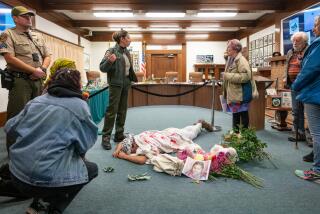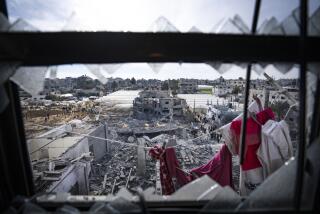Scenes from Egypt’s uprising
For years, Egyptians fearful of their country’s pervasive secret police apparatus would reflexively lower their voices and glance around before daring to speak a word against President Hosni Mubarak. During these heady days in Tahrir, or Liberation, Square, they’ve felt free to speak their minds, and vent their anger.
Asked Tuesday about their president of three decades, some spat out epithets: Pig. Dog. Donkey. The most extreme display of fury might have been a pair of effigies dangling from traffic lights, emblazoned with calls to put Mubarak on trial.
Posters also spoke volumes. “Mubarak, Jidda is waiting for you,” read one, referencing the Saudi destination of the Tunisian president after his country’s recent revolution.
But surprising numbers of people in the square chose a less vociferous approach.
One hand-scrawled sign played on a popular Egyptian song about table tennis. In a cadence echoing its lyrics, the sign counseled the president to go play pingpong someplace else.
A protester held a kitten with the name tag, Mubarak, wrapped around its neck. Asked why, the feline’s owner said that there was no good reason.
And then there was the mother who had decked out her little boy in a sparkly party hat. “I want him to remember this as a time of happiness, not hatred,” she explained.
::
Dress as you are. That seemed to be the watchword among the scads of protesters.
Egyptians often travel in circles segregated by class. But during their days and nights in Tahrir Square, any small slice of the crowd offered a sartorial cross section: workmen’s rough jackets, female university students in flowing locks and tight jeans alongside those in head scarves or full face veils, fashionable matrons in proper pumps and careful coiffures, bankers and lawyers in sharp business suits, devout Muslims in beards and prayer caps all rubbing shoulders as the plaza filled and spilled over with humanity.
::
In the early days, the protests skewed heavily toward young men. But by Tuesday, the crowd in the square included many women, children and the infirm — a sign of the growing confidence that the army would abide by its pledge not to fire on the demonstrators.
One man limped on a cane; another sat in a wheelchair. A blind man was led along by a friend.
Two elderly women tottered side by side, seemingly holding each other upright. When one of them stumbled on a piece of lumber lying on the ground, those nearby scrambled to help. “Careful, sister, careful!” someone called out.
Parents who brought their babies to the square praised the day and said the world should know just how peaceful the rally had been. Many in the teeming crowds vowed to return in the morning. “I’ll keep coming back until the president leaves,” said Mohammed Qassem, 34.
It was a day of wonder for older Egyptians who never imagined a public uprising. Awatef Abdul Rahman, with a giant beehive hairdo and big brown earrings, walked past tanks and soldiers and volunteers who searched demonstrators as they entered. “Egypt is changing,” she said. “We are here to support the protest of the youth.”
::
In the heart of a great metropolis, the square took on the characteristics of a city in miniature, where people eat, sleep and pray. Some men brought prayer rugs, others spread out jackets at prayer time.
There were clear signs of social organization: neatly packed and piled garbage, orderly distribution of food and bottled water. On one edge of the square, a pungent odor signaled the area had become an open-air latrine when crowds camped there overnight.
::
As night fell, 16-year-old Suleiman Mohammed sat on the curb, one of the hundreds of faithful who would sleep outside through the cold Cairo winter night. Small and frail, he was sandwiched between men in their 20s and 30s. They towered over hm. Still in high school, Suleiman had come alone, with his parents’ support. “I don’t have a future. I’ll stay here till I make myself a future,” the boy said.
A man named Selim, listening to the teenager, piped in: “We are going to stay until Mubarak leaves tonight.”
He shivered slightly from the cold. “When Mubarak leaves, we will be warm,” he said amid a group of strangers clustered together on the sidewalk.
::
In a muddy grass median at the square, people raw with emotion after Mubarak’s late-night no-reelection announcement camped out by fires. Voices were raised and men shouted over one another, irritable in the cold, the smoke making thin clouds.
“We need someone to arrest Hosni Mubarak. He must pay for the blood of those guys attacked here at this square,” said Abdullah Mohammed, 57, bundled in a winter coat. “We will stay a month. It doesn’t matter.”
A companion huddled by the fire, Abdul Haweb, chimed in loudly. “We will take our clothes off and stand in front of the tanks. We don’t care if they kill us.”
His friend nodded and Haweb shouted out his grievances. “I have seen nothing but corruption, violations of human rights, no freedom of speech. I have nothing.”
The fire crackled and the chants gave way to nationalist songs as the men sat in the cold of night and wondered what will come next.
Times staff writers Ned Parker and Laura King prepared these vignettes.
More to Read
Start your day right
Sign up for Essential California for news, features and recommendations from the L.A. Times and beyond in your inbox six days a week.
You may occasionally receive promotional content from the Los Angeles Times.






